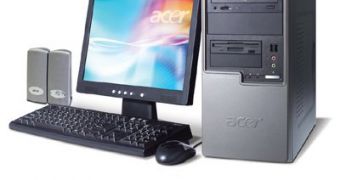Taiwanese notebook PC vendor will start manufacturing Acer-branded desktop computers, as well as fully-fledged gaming systems. The situation may seem a little confusing, given the fact that Acer has been associated with notebook PCs, but the company starts pitching at the desktop market as well.
The news have been broken by Acer's senior vice president, James T. Wong, who admitted that the company is seriously thinking to release a gaming computer based on open standards.
"If you look at most of the other game machines that are out there right now - Nintendo's, the Xbox - they are 'closed' and proprietary systems," he told BetaNews. However, opened standards are just a part of the final picture, as the upcoming offerings will arrive in less-conventional form standards and will drive new applications.
According to the same source, one of the main reasons Acer inked the Gateway buyout was the latter's expertise on the desktop market. In spite of the fact that Acer will release its own-branded desktop computers, it will also continue shipping desktop systems under the brand of the companies it owns: Gateway, eMachines and Packard Bell.
However, Acer does not need Gateway's expertise in the desktop sector in order to buy its own systems. The company has been building desktop computers for quite some time now, as part of its OEM business.
The upcoming desktop systems released under the above-mentioned brands are alleged to come into two distinct line-ups, depending on their market destination. According to Wong, the systems will be available in both consumer and small-to-midsize business versions. Wong also claimed that Acer will still keep away from the enterprise market, and does not plan to release either desktop or notebook computers targeted at this level, because it would require more resources than the company is willing to provide.
"You need different kinds of resources for [enterprise systems], and we don't have those kinds of resources right now," he concluded.

 14 DAY TRIAL //
14 DAY TRIAL //